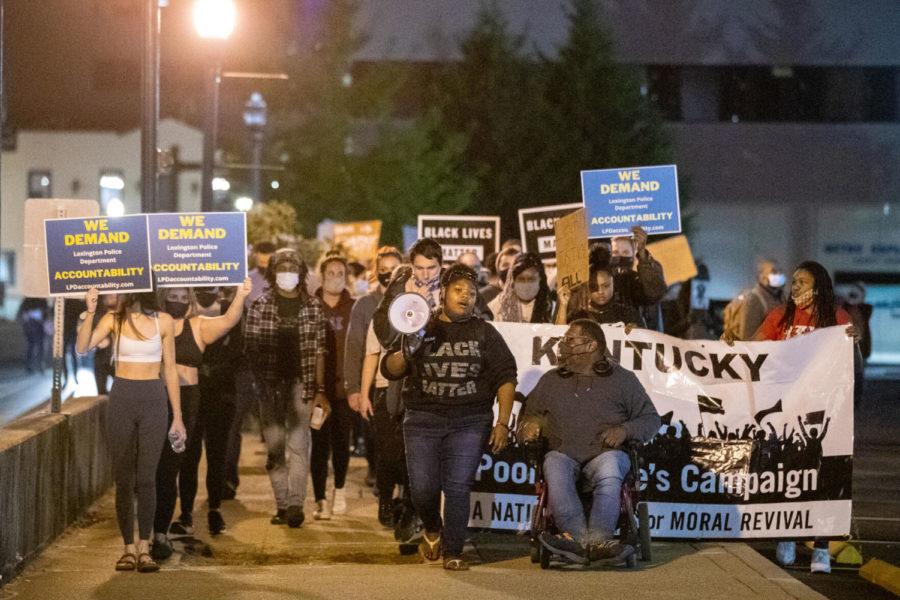Celebrating was never an option: things to keep in mind this February
Protesters march down the sidewalk during a protest in response to the grand jury decision on the Breonna Taylor case on Wednesday, Sept. 23, 2020, in Lexington, Kentucky. Photo by Michael Clubb | Staff
February 5, 2021
Even after a year of protest against racial injustice, it’s important to recognize Black History Month. I don’t think it would be far off to argue that if we as a country would’ve acknowledged our racist history and given Black people the credit for everything we’ve created from the get-go, we wouldn’t be in this mess. However, this isn’t to say that just because white people pull out their favorite MLK lines and put black squares on their Instagrams, the cancer that is racism in our society is being cured.
I made the conscious decision about a year or two ago to stop talking to white people about race. I can’t remember when I officially put my foot down and made that decision, but I know it had to be in response to something. Maybe it was another story of a police officer killing a Black person. Maybe it was a video of a school officer slamming a Black child to the ground in retribution for a minor offense. Or maybe it was when I realized a lot of people refuse to acknowledge this country was built on the commodity, pain, and suffering of Black and indigenous people.
The point is that I don’t know when, but I do know that during that time, I was doing a disservice to myself. I realized in response to the murder of Breonna Taylor that I was in the wrong by keeping my mouth shut and letting people exist in spaces without feeling a tad bit as uncomfortable as I did.
My whole reasoning was this concept that “Google is free,” a simple sentence my own mother tells me in a sing-song tone every time I ask her a question. But herein lies the issue of people not knowing what to Google about. We have gotten away with a watered-down version of history that has made it hard to know where to start in terms of unlearning rhetoric and propaganda in order to get to the truth of the matter.
And the truth is racism is more than slurs and supremacist ideology.
So now, I talk about my experience as it is, no more, no less. Other Black people and I do not exist to trauma dump as if we’re writing a scholarship essay in order to beg white people to believe in racism.
Racism is not a ghost or boogie man.
It is blatant. It is in everyone’s face. Black people and other people of color owe white people nothing. Everything that we do as oppressed people in an oppressive society should be purely for self-preservation.
Just because we had a “reckoning” in how we report and see racial injustice doesn’t mean we get to stop talking about it. I think if anything, this Black History Month will serve as a turning point in how we talk about the history of race in America. Maybe I’m being a bit optimistic, but I think white people are starting to clue in on why phrases like, “this isn’t who we are” in the face of predictable insurgence are not okay, and have started to shift the tide from the “perfect American image” hill people are willing to die on.
Reaffirming statements are tools, usually given to a person by a mental health counselor to use in order to rebuild confidence and ground themselves. Black Lives Matter is a reaffirming statement, a statement that needed to be created because Black people were shown through the action of the government and social constructs that their lives did not hold the same value to their white counterparts.
It’s great to celebrate Black history, but there’s still more Black history to learn about, and even more importantly, to be made.
































































































































































